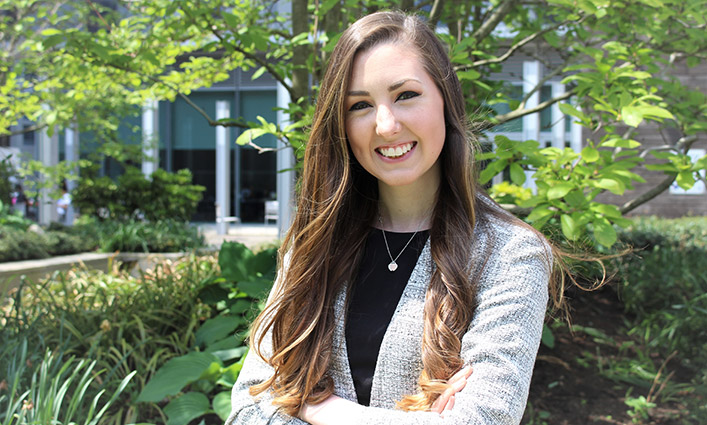
Therese Todd ’23, winner of the National Science Foundation (NSF) Graduate Research Fellowship, hopes her research in the fields of law and mental health will influence policy change and lead to greater interventions and treatment programs for individuals struggling with mental health issues. Her winning research proposal, titled “Implicit Bias Toward Persons with Mental Illness and Police Officer Decision-Making,” will investigate the relationship between implicit bias against people with mental illness and the use of force and disposition decisions, such as arrests, by police officers. “We all carry biases within us. The biases that we are not consciously aware of are called implicit biases. They operate at an unconscious and automatic level of our cognition,” said Todd. “Some of the most common biases and myths about persons with mental illness are related to violence, dangerousness, and unpredictability.”
“Some of the most common biases and myths about persons with mental illness are related to violence, dangerousness, and unpredictability.” —Therese Todd
The Value of Research
Todd, a Clinical Psychology doctoral student from the CUNY Graduate Center at John Jay, will examine how implicit bias may influence an officer’s decision-making process, and then find ways to improve how law enforcement officials respond to persons suffering from mental illness. “I think it’s important that the research evaluates these interactions and seeks ways to improve how police can respond to a person with mental illness,” said Todd. “By reducing the rate of mental illness within our nation’s correctional facilities, we can divert persons away from the criminal justice system and into treatment in the mental healthcare system. This will increase safety for both the officers and civilians involved in these interactions.”

Providing some backdrop for her research, Todd explained that people with mental health issues often have a difficult time when coming face-to-face with the legal system. “For those struggling with mental health concerns, it can be an extremely difficult and isolating experience. When people who are already having a difficult time encounter justice issues, it may be more difficult for them to communicate with an officer or to advocate for themselves throughout the legal process,” said Todd. “Police officers are often the first to interact with persons in crisis or with mental illnesses, serving as mental health proxies when family or the public calls 911, but they are not trained mental health professionals. Until agencies start developing ways to reduce these occurrences, officers will need to be better prepared to handle these situations. In order to do so, it is necessary that research identify problem areas where current practices may be falling short.”
“I hope my research brings awareness to potentially harmful consequences of mental health bias, specifically in the criminal justice system.” —Therese Todd
Todd’s goal is that the research she’s conducting leads to the allocation of resources to train officials in community mental health. “I hope my research brings awareness to potentially harmful consequences of mental health bias, specifically in the criminal justice system. If more efforts are put into community treatment and intervention, then adequate and necessary treatment to individuals struggling with mental health can be provided. This will help reduce the amount of criminal justice encounters experienced by persons with mental illness in the first place.”

The Value of Mentors
To conduct her research, Todd has sought the guidance of her mentor Preeti Chauhan, Ph.D., Associate Professor of Psychology and Director of the Data Collaborative for Justice at John Jay. Chauhan has been a fixture in Todd’s life since she arrived at John Jay in 2017. After earning her B.A. in Psychology from UCLA, Todd moved to New York where she enrolled in the Ph.D. program at the College. “John Jay’s dedication to social justice and criminal justice reform is what brought me here,” said Todd. “More specifically, the opportunity to work with Dr. Preeti Chauhan, whose research has influenced policy, specifically New York’s Criminal Justice Reform Act, was the main factor in my interest in John Jay.”
“John Jay’s dedication to social justice and criminal justice reform is what brought me here.” —Therese Todd
Her work with Chauhan these last two years has led to opportunities at both the Vera Institute of Justice and the Data Collaborative for Justice. At the Vera Institute, Todd contributed to a study that looked at jail responses to suicide and self-harm among criminal justice involved individuals. At the Data Collaborative for Justice, she worked on a project that looked at the factors that influenced drug charge reductions in New York City over the last 25 years. “My experience with the Ph.D. program at John Jay and with Dr. Chauhan has been incredibly rewarding. I’ve been able to work alongside some of the most talented, intelligent, and caring individuals both in and outside the program,” said Todd.
The experience has been so meaningful, that Todd has decided to pursue a career in academia and research in hopes of inspiring the next generation of researchers and change makers. “I plan to become a professor and graduate mentor so that I can share my expertise in psychology and law with students. I want to improve the experiences of persons with mental illness in the criminal justice system, and by educating others, I can make sure that these improvements continue for years to come.”



